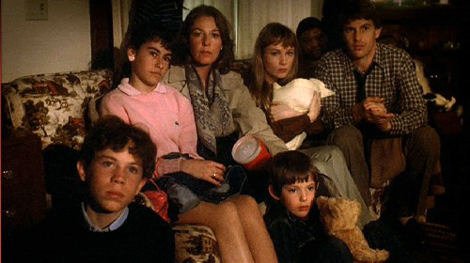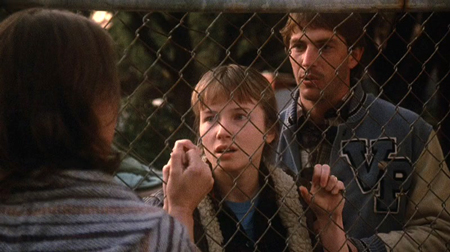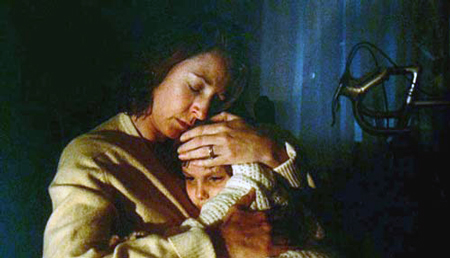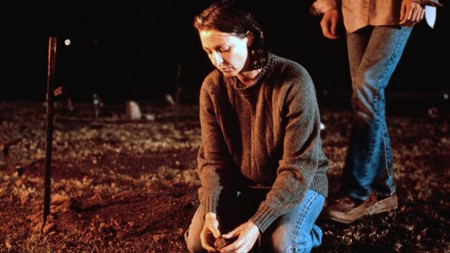Reviewed by Glenn Erickson
The most credible post-apocalyptic movie yet.
The early 1980s saw an uptick in international pressures. When Ronald Reagan declared the Soviet Union an "evil empire" the possibility of nuclear war felt more real than ever. The earlier Three Mile Island nuclear accident had already raised the public's awareness of the hazards of radioactive poisoning, and PBS television specials reported on the insanity of Mutual Assured Destruction as a defense/deterrent strategy. In terms of nuclear consciousness, it was a return to the Eisenhower years. President Reagan joked about bombing Russia.
Most movies about nuclear peril date from the 1950s science fiction boom, which often expressed doomsday fears in fantastic terms. But that decade ended with Stanley Kramer's powerful On the Beach, a realistic post-apocalyptic drama based on the idea that the radioactivity loosed by a nuclear exchange could exterminate all of humanity. After Stanley Kubrick's excellent horror-comedy Dr. Strangelove, the theme of "pushing the button" became an overused cliché.
Ronald Reagan and Margaret Thatcher's aggressive rhetoric against the Soviet Union once again brought the subject to the forefront, and nuclear war-themed movies suddenly came back into vogue. College audiences laughed and gasped at 1982's The Atomic Cafe, an advocacy documentary made from old government films and newsreels. It re-popularized the bizarre "Duck and Cover" cartoon once shown in schools. But 1983 saw a batch of liberal-minded pictures commenting on the precarious nuclear standoff. In March NBC broadcast Special Bulletin, in which terrorists detonate a nuclear bomb in the port of Charleston, South Carolina. Using a "faux reality" format, the show was made to look like normal broadcast coverage. The juvenile thriller WarGames was released to theaters in May. It concluded peacefully, with a computer lecturing teenager Matthew Broderick and a hawkish general that nuclear war is, "A strange game. The only winning move is not to play." 1
Later in the year, ABC broadcast the two-part miniseries The Day After, a doomsday tale following the fates of a number of Kansans during an all-out war. Graphic special effects depicted an entire city's population vaporized by a hydrogen blast. It is estimated that 100 million Americans tuned in.
But arguably the most artistic and emotionally effective anti-nuke movie of the Reagan years is Lynne Littman's Testament. The low-budget production was filmed for broadcast on Public TV's American Playhouse, but Paramount was so impressed that they picked it up for theatrical distribution. It opened to critical accolades but modest business, as word of mouth spread that it was an almost intolerably sad and depressing viewing experience. Like On the Beach, Littman's film shows no atomic bombings and concentrates on the effect of atomic war on ordinary people. But unlike Stanley Kramer's movie the ordinary people in Testament are not played by glamorous movie stars. The citizens of a small Northern California town find themselves suddenly isolated, with little or no news from the outside world, and facing lonely, hopeless deathwatch.

Screenwriter John Sacret Young concentrates most of the drama within a single household. The Wetherly family lives in Hamelin, a wooded bedroom community inland of San Francisco. Carol (Jane Alexander) is a housewife. Tom (William Devane) works in the city and likes to stay active with his older son Brad (Ross Harris). Young Scottie (Lukas Haas of Mars Attacks!) hasn't started school yet. Daughter Mary Liz (Roxana Zal) is just getting to the age that she's thinking about boys. Carol and Tom have their differences but manage to get along with a degree of harmony.
In one afternoon everything changes. A news announcement about atomic strikes on the Eastern seaboard is cut off when the TV and all normal communications are knocked out. Carol nervously waits for Tom to return; he often works late but this day left a phone message saying that he was already on his way home. The initial fear turns into a gnawing uncertainty as days and then weeks go by. Tom doesn't appear. After some initial looting the small community draws together. The school tries to keep things as normal as possible for the kids. Brad helps round up batteries for use in radios and flashlights. Carol and her three children grow closer to their neighbors. Service station owner Mike (Mako) rations out what gas remains and comforts his developmentally challenged son Hiroshi (Gerry Murillo). Elderly Rosemary and Henry Abhart (Lurene Tuttle & Leon Ames) become the neighborhood's only link to the outside world, for Henry picks up bits of outside news on his generator-powered ham radio.

Depression sets in as all realize that the worst is occurring: animals, babies and the infirm are the first to be affected by higher levels of airborne radiation, presumably from blasts in the cities and military targets. Young marrieds Phil and Cathy Pitkin (Kevin Costner & Rebecca De Mornay) panic when their newborn baby falls sick. Some people leave, although the news is that the same thing is happening everywhere. As homes go dark, the business of dealing with the dead begins. All Carol can do is gather her children closer and do her best to keep hope alive.
Our society makes mock-cynical jokes about death, but most of us sing a different tune when the subject becomes unavoidable. With some emotional reserves and the support of loved ones, most of us can face mortality. We may also gain comfort if we have children that will live on after us. But the unnatural nuclear threat negates normal human values. Testament offers a convincing scenario for utter doom, as experienced by a fairly stable American family. The end doesn't arrive as a Bang but neither does it come as a Whimper. Our selected family instead dies by stages. At first Carol joins in the community effort to maintain morale. Now the man of the family, poor Brad takes to his bicycle to carry messages and show his mother that he can be a good trouper.

The movie becomes more claustrophobic as Hamelin shuts down. Director Littman occasionally cuts to home movies of the Wetherly family, laughing and playing outdoors. One day Brad finds Hiroshi left all alone, and brings him home. Carol's burden is appalling. Raising children shouldn't be about helping them to die, and worrying if one is going to die first. A child is all about plans for the future. Mary Liz withdraws, Brad tries to support his mother and little Scottie tires to understand what's going on. He asks his mother, "Make it go away".
The movie avoids truly intolerable events but doesn't flinch from suggesting them. At one point we see a young father in shock, carrying a dresser drawer to use as a coffin for his dead infant. No editorial speeches are delivered about the causes of the war, as in On the Beach. We're instead given a little school play, the kind that parents attend to see their kids perform on stage. The play is "The Pied Piper of Hamelin", about the irresponsibility of parents toward their children. The teachers give the play a hopeful ending -- the thoughtless people of Hamelin will get their children back "when they deserve them".

Why put the audience through this ordeal? Testament pulls the discussion of nuclear war back down to reality. It isn't a fantasy about violence on the highways and it isn't some vague allegory with zombies. There is no special effects spectacle of destruction to admire, only a very possible scenario that society cannot afford to ignore. Lynne Littman's film reached a much wider audience when it was shown on PBS in 1984. Its personal, family-oriented horrors hit us where we live.
The Warner Archive Collection DVD-R of Testament is a re-issue of a much older Paramount disc and appears to be the exact same pressing. The enhanced image is detailed and accurate, and James Horner's sensitive music score comes across well on the clear soundtrack. English subs are encoded as well. Although the setting looks like Northern California, the film was shot in Sierra Madre, a suburb of Los Angeles. Steven Poster's cinematography makes the most of the rainy streets, and the set dressers create the illusion of trash piling up and lawns dying out.

The extras from the original release have been included. In 2003 Lynne Littman directed Testament at 20, a making-of remembrance reunion. Several of the film's actors became stars in the interim. Now adults, the three child actors still feel like a family. Littman's second featurette Nuclear Thoughts combines more interviews with news film and talks with school children to talk about nuclear sanity in the post- September 11 world. And a text scroll offers a number of key dates for a Timeline of The Nuclear Age.
On a scale of Excellent, Good, Fair, and Poor,
Testament rates:
Movie: Excellent
Video: Very Good
Sound: Very Good
Supplements: 2003 featurette Testament at 20, discussion featurette Nuclear Thoughts.
Deaf and Hearing Impaired Friendly?
YES; Subtitles: English
Packaging: Keep case
Reviewed: August 6, 2014
Footnotes:
1. The TV movie Special Bulletin was released by The Warner Archive Collection in 2010 but is no longer offered on the WAC website.
Return

Text © Copyright 2014 Glenn Erickson
See more exclusive reviews on the Savant Main Page.
Reviews on the Savant main site have additional credits information and are often updated and annotated with reader input and graphics.
T'was Ever Thus.
Return to Top of Page
|

